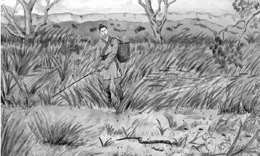一天,有人到王鲁这儿控告他的主簿。 这个主簿的罪行,跟王鲁的所作所为几乎完全相同。王鲁吓得都不知道如何来处理这件案子。他没有作出判决,而是不由自主的在状子上写道:“你虽然打的是草,但我这种像伏在草下的蛇,也受到惊吓了!”
由此产生了“打草惊蛇”这个成语。原先的意思是指对某人的惩罚成了对其他人的警告。但现在人们用它指使敌人产生戒备的不成熟的行为。
Beat the grass and startle the snake
Long long ago, a county magistrate named Wang Lu worked in present day Anhui province, East China. Wang Lu was very greedy and took many bribes. One of his secretaries was equally corrupt, and often schemed for Wang Lu's deeds.
One day a man went to the magistrate to lodge a complaint against the secretary. The secretary's crimes were almost the same as the crimes the magistrate himself committed. Wang Lu was so frightened, he forgot his proper role in handling the case. Instead of issuing a judgment, he couldn't help writing these words concerning the complaint: "By beating the grass, you have startled me who am like a snake under the grass!"
The above story provided the idiom "Beat the grass and startle the snake". The original meaning is that punishment for someone can serve as a warning to others. But people now use the idiom to indicate that premature actions which put the enemy on guard.

|
贿赂 bribe |
罪行 crime |
判决 punishment |
|
惊吓 startle |
惩罚 punishment |
不由自主can't not help doing |
 English
English Japanese
Japanese Korean
Korean French
French German
German Spanish
Spanish Italian
Italian Arab
Arab Portuguese
Portuguese Vietnamese
Vietnamese Russian
Russian Finnish
Finnish Thai
Thai dk
dk